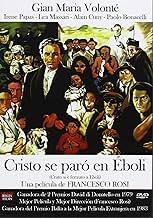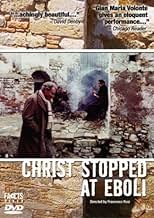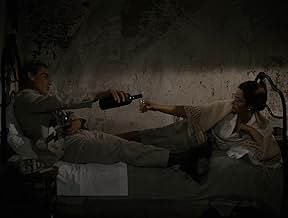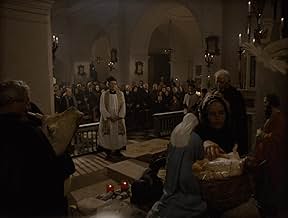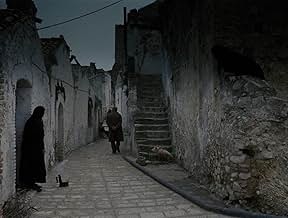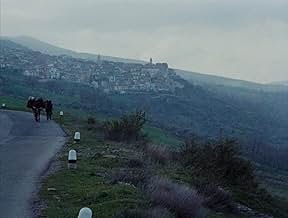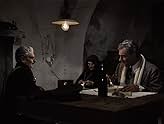IMDb-BEWERTUNG
7,7/10
4460
IHRE BEWERTUNG
Ein Arzt im faschistischen Italien wird wegen seiner politischen Ansichten in ein abgelegenes Dorf ins Exil geschickt.Ein Arzt im faschistischen Italien wird wegen seiner politischen Ansichten in ein abgelegenes Dorf ins Exil geschickt.Ein Arzt im faschistischen Italien wird wegen seiner politischen Ansichten in ein abgelegenes Dorf ins Exil geschickt.
- 1 BAFTA Award gewonnen
- 7 Gewinne & 1 Nominierung insgesamt
Enzo Vitale
- Dottore Milillo
- (as Vincenzo Vitale)
Empfohlene Bewertungen
"If these people in Rome have so much money to spend on war, why don't they spend it here?"
For his antifascist views, the writer and painter Carlo Levi was exiled by Mussolini in 1935 to the gorgeous but rugged and isolated stone town of Aliano in Basilicata, 90km away from Matera. At this time it was an area known for being unchanged over centuries and rather backward by people in the north, and Levi describes it as not even having been visited by Christ, who he says went no further than the train station in Eboli. In one sense religion plays a role here, with one devout landowner saying he's seen a saint at a religious site and a gravedigger saying he saw the devil on a stormy night, but in another sense, they seem to believe more in folklore, ignore the local priest, and only attend mass at holiday time.
From the beginning Levi (played by Gian Maria Volonté) encounters conservative customs and ignorant superstitions, e.g. Daughters who have to spend a year in seclusion if a brother dies (three if it's the father), a doctor who believes the women in town put menstrual blood in "love potions," and the woman whose house he's staying in believing her husband died because a peasant witch put an "evil eye" on him before giving him a deadly magic potion. Eventually Levi takes his own place and hires a maid (Irene Papas) who expresses the peasants' belief that a rainbow causes a certain disease, trash can't be thrown out at night lest it hit the angel that guards the house until daybreak, and that the spirits of the unbaptized can reveal locations of treasure to people in dreams.
Despite being in the middle of nowhere, Levi came to appreciate the hard lives the poor peasants led and saw the injustice of them being ruled from afar by the government to the north, practically a separate Italy, leaving them not represented well at all. They were largely forgotten by the rest of the country until it came time to extract something out of them, e.g. Money for taxes, or young men for war. An example of a new law is higher taxes on goats because they're believed to be bad for farming in the north, but this is terrible for the peasants in this south who depend on them and now feel they have to kill them (beware, there is a butchering scene during this segment, as well as a graphic pig castration scene later). Meanwhile, a cranky tax collector is bitter over how the locals treat him, but who can blame them when he describes his job as taking whatever they have to collect what they owe - a goat, rabbit, wheel of cheese, or bottle of olive oil.
As a warning, this is not a plot-heavy story, and Levi soon settles into the sleepy rhythms of the town, among other things wandering about and watching the kids up to various mischief, like harassing a goat by hitting it with a stick while riding it, or throwing rocks at the local priest. One day Levi lies in a freshly dug grave to beat the heat, and in general he spends time painting and reading the books he can get his hands on. His copy of a book by Montaigne is confiscated by the town mayor as it's in French and deemed "dangerous." The mayor gives a speech to the townsfolk where attendance is mandatory and he extols the virtues of Mussolini invading Abyssinia. He says "The Roman legions once ruled the world. Rome's renewed greatest shines on its seven hills!" to which Levi says privately to himself, "...Shines on the seven hills. But here the hills crumble and turn to dust."
There are some in the town who have escaped their hard life by going to America, but as they're separated from family many of them return. One has a photo of FDR on his wall and is listening to aviator Francesco de Pinedo on a phonograph when Levi meets him (Pinedo was a pioneering Italian aviator who had died in a crash just a couple of years earlier). In another scene there is a rousing folk song performed, one reminding me of Portuguese fado, expressing the bittersweet feelings of being separated from loved ones by going to America.
Levi toes the line in not agitating with his political views, but quietly chafes when the mayor reads all his mail and finds certain correspondences objectionable. The mayor wants to believe he's an educated man like Levi and to talk to him like a fellow intellectual, and their discussions were among the most interesting scenes in the film for me. It's notable that the mayor excuses himself from enlisting in the invasion against Abyssinia because of his "health issues," for isn't this usually the way with these kinds of guys? And meanwhile, Levi expresses a deeper truth, that the peasants have a fundamental distrust of all flags and wars based on history, and moreover, that they view the government as something to be endured, like an event out of nature, completely separate from them. He says:
"The State is 'the people in Rome' who have always existed and always will, like hail, landslides, drought, and malaria. For the peasants, the State is farther away than the sky, and more evil because it's always their adversary. The State is a form of fate like the wind that burns the crops, and the fever that burns the blood."
It's in these moments we get the best feeling for the dynamic between north and south, and some of the south's history, like local feelings for the brigands who surfaced after unification 75 years earlier.
The final episode was rather slow as not much new was revealed, and not much had ever developed with Papas's character. It's probably true to life that way, with Levi expressing his goodbyes to the peasants who had appreciated his doctoring, and ultimately never returning. He has a conversation with his intellectual friends in the north, however, and surprises them by saying that to the south, it wouldn't matter what type of government ruled in Rome - fascist, progressive, or communist - as long as it didn't involve the peasants directly. Even though the book was published nearly 80 years ago, this adaptation is fascinating for its window into an era, as well as a springboard into further reading on Italy's "Southern Question."
For his antifascist views, the writer and painter Carlo Levi was exiled by Mussolini in 1935 to the gorgeous but rugged and isolated stone town of Aliano in Basilicata, 90km away from Matera. At this time it was an area known for being unchanged over centuries and rather backward by people in the north, and Levi describes it as not even having been visited by Christ, who he says went no further than the train station in Eboli. In one sense religion plays a role here, with one devout landowner saying he's seen a saint at a religious site and a gravedigger saying he saw the devil on a stormy night, but in another sense, they seem to believe more in folklore, ignore the local priest, and only attend mass at holiday time.
From the beginning Levi (played by Gian Maria Volonté) encounters conservative customs and ignorant superstitions, e.g. Daughters who have to spend a year in seclusion if a brother dies (three if it's the father), a doctor who believes the women in town put menstrual blood in "love potions," and the woman whose house he's staying in believing her husband died because a peasant witch put an "evil eye" on him before giving him a deadly magic potion. Eventually Levi takes his own place and hires a maid (Irene Papas) who expresses the peasants' belief that a rainbow causes a certain disease, trash can't be thrown out at night lest it hit the angel that guards the house until daybreak, and that the spirits of the unbaptized can reveal locations of treasure to people in dreams.
Despite being in the middle of nowhere, Levi came to appreciate the hard lives the poor peasants led and saw the injustice of them being ruled from afar by the government to the north, practically a separate Italy, leaving them not represented well at all. They were largely forgotten by the rest of the country until it came time to extract something out of them, e.g. Money for taxes, or young men for war. An example of a new law is higher taxes on goats because they're believed to be bad for farming in the north, but this is terrible for the peasants in this south who depend on them and now feel they have to kill them (beware, there is a butchering scene during this segment, as well as a graphic pig castration scene later). Meanwhile, a cranky tax collector is bitter over how the locals treat him, but who can blame them when he describes his job as taking whatever they have to collect what they owe - a goat, rabbit, wheel of cheese, or bottle of olive oil.
As a warning, this is not a plot-heavy story, and Levi soon settles into the sleepy rhythms of the town, among other things wandering about and watching the kids up to various mischief, like harassing a goat by hitting it with a stick while riding it, or throwing rocks at the local priest. One day Levi lies in a freshly dug grave to beat the heat, and in general he spends time painting and reading the books he can get his hands on. His copy of a book by Montaigne is confiscated by the town mayor as it's in French and deemed "dangerous." The mayor gives a speech to the townsfolk where attendance is mandatory and he extols the virtues of Mussolini invading Abyssinia. He says "The Roman legions once ruled the world. Rome's renewed greatest shines on its seven hills!" to which Levi says privately to himself, "...Shines on the seven hills. But here the hills crumble and turn to dust."
There are some in the town who have escaped their hard life by going to America, but as they're separated from family many of them return. One has a photo of FDR on his wall and is listening to aviator Francesco de Pinedo on a phonograph when Levi meets him (Pinedo was a pioneering Italian aviator who had died in a crash just a couple of years earlier). In another scene there is a rousing folk song performed, one reminding me of Portuguese fado, expressing the bittersweet feelings of being separated from loved ones by going to America.
Levi toes the line in not agitating with his political views, but quietly chafes when the mayor reads all his mail and finds certain correspondences objectionable. The mayor wants to believe he's an educated man like Levi and to talk to him like a fellow intellectual, and their discussions were among the most interesting scenes in the film for me. It's notable that the mayor excuses himself from enlisting in the invasion against Abyssinia because of his "health issues," for isn't this usually the way with these kinds of guys? And meanwhile, Levi expresses a deeper truth, that the peasants have a fundamental distrust of all flags and wars based on history, and moreover, that they view the government as something to be endured, like an event out of nature, completely separate from them. He says:
"The State is 'the people in Rome' who have always existed and always will, like hail, landslides, drought, and malaria. For the peasants, the State is farther away than the sky, and more evil because it's always their adversary. The State is a form of fate like the wind that burns the crops, and the fever that burns the blood."
It's in these moments we get the best feeling for the dynamic between north and south, and some of the south's history, like local feelings for the brigands who surfaced after unification 75 years earlier.
The final episode was rather slow as not much new was revealed, and not much had ever developed with Papas's character. It's probably true to life that way, with Levi expressing his goodbyes to the peasants who had appreciated his doctoring, and ultimately never returning. He has a conversation with his intellectual friends in the north, however, and surprises them by saying that to the south, it wouldn't matter what type of government ruled in Rome - fascist, progressive, or communist - as long as it didn't involve the peasants directly. Even though the book was published nearly 80 years ago, this adaptation is fascinating for its window into an era, as well as a springboard into further reading on Italy's "Southern Question."
Christ Stopped at Eboli is one of the best movies by Rossi, loyal to his tradition of neorealism. The movie depicts isolated rural-peasant life as an account of an urban intellectual doctor, painter and a political activist who has been exiled to this remote area due to his political dissent during the Fascist rule in Italy. Not like similar movies in lenght, Crist Stopped at Eboli constantly absorbs audience, probably due to its realist description and selective representation of peasant life which is "frozen in time". The film pushes the audience to contemplate on philosophical aspects of the concept of time and it is heavily imbued with the display of social and political problems.
Rosi beautifully describes the destitute of the peasant settlers of this remote and isolated land, their ignorance and apolitical life, the deep rift between these people and state, and the irrelevance of the quasi-comic "victories" of the Il Duce to these people among many other social and political issues. Like Rosi's other movies here again neorealist representation goes along with the combination of documentary techniques and fictional context. Rosi lets the images to speak for themselves rather than the Gian Maria Volente who is in the central role in the movie.
In the movie (as it is in the book), the peasant life and urbanity are represented as two alien civilizations and antithesis of each other. These peasants have their own way of life, own customs, own aspirations and means of joy. What is going on Rome or the war in Abyssinia for "regaining the glory of the Rome" does not capture their interest. They are aware of the state through the taxes collected or men called for military service. In his letter, Levi describes the urban civilization as an antithesis of this peasant life which aspired throughout the history to "colonize" it.
The Christ Stopped at Eboli also pushes the audience to ponder on the philosophical meaning of history, its relevance nature and meaning. It describes this peasant life as "frozen in history", cut from outside life and lacking the understanding of time that we have. History as we understand is the history of "urban civilization". As peasants are alien to this civilization they are alien to this concept of time as well. In the village you stop counting days, hours as they become more and more irrelevant, there you return and base your life on the natural cycle of life which is based on seasons. In this sense the movie challenges our notion of history which is the history of the "city".
In this sense Christ Stopped at Eboli is very analogous to Y. K. Karaosmanoğlu's Yaban. Yaban is also the story of a Turkish intellectual war veteran who abandons amenities of Istanbul for the Central Anatolian village with the hope of finding his roots and alleviating the torments of his memoirs. However, to his disappointment he finds himself in an alien peasant "civilization" where he can not communicate to those people, can not be similar to them and can not understand their aspirations. What makes Yaban and Christ stopped at Eboli similar is their approach to dichotomous nature of human civilization and the concept of time. In both novels there is a representation of antagonist peasant and urban civilizations, and a relative concept of time. In both novels there is description of life which is "frozen in time" and alien to urbanity. Indeed the study of Yaban from this perspective can be insightful for the discussions of continuity and change in the History of Mediterranean, as Turkey is widely excluded from such studies. However when you read Christ stopped at Eboli and Yaban what strikes you first is the patterns of similarity in peasant life and experience of the intellectuals visiting these places. They can back both the universality of "two civilizations" argument and lounge duree approach in the Mediterranean area.
Rosi beautifully describes the destitute of the peasant settlers of this remote and isolated land, their ignorance and apolitical life, the deep rift between these people and state, and the irrelevance of the quasi-comic "victories" of the Il Duce to these people among many other social and political issues. Like Rosi's other movies here again neorealist representation goes along with the combination of documentary techniques and fictional context. Rosi lets the images to speak for themselves rather than the Gian Maria Volente who is in the central role in the movie.
In the movie (as it is in the book), the peasant life and urbanity are represented as two alien civilizations and antithesis of each other. These peasants have their own way of life, own customs, own aspirations and means of joy. What is going on Rome or the war in Abyssinia for "regaining the glory of the Rome" does not capture their interest. They are aware of the state through the taxes collected or men called for military service. In his letter, Levi describes the urban civilization as an antithesis of this peasant life which aspired throughout the history to "colonize" it.
The Christ Stopped at Eboli also pushes the audience to ponder on the philosophical meaning of history, its relevance nature and meaning. It describes this peasant life as "frozen in history", cut from outside life and lacking the understanding of time that we have. History as we understand is the history of "urban civilization". As peasants are alien to this civilization they are alien to this concept of time as well. In the village you stop counting days, hours as they become more and more irrelevant, there you return and base your life on the natural cycle of life which is based on seasons. In this sense the movie challenges our notion of history which is the history of the "city".
In this sense Christ Stopped at Eboli is very analogous to Y. K. Karaosmanoğlu's Yaban. Yaban is also the story of a Turkish intellectual war veteran who abandons amenities of Istanbul for the Central Anatolian village with the hope of finding his roots and alleviating the torments of his memoirs. However, to his disappointment he finds himself in an alien peasant "civilization" where he can not communicate to those people, can not be similar to them and can not understand their aspirations. What makes Yaban and Christ stopped at Eboli similar is their approach to dichotomous nature of human civilization and the concept of time. In both novels there is a representation of antagonist peasant and urban civilizations, and a relative concept of time. In both novels there is description of life which is "frozen in time" and alien to urbanity. Indeed the study of Yaban from this perspective can be insightful for the discussions of continuity and change in the History of Mediterranean, as Turkey is widely excluded from such studies. However when you read Christ stopped at Eboli and Yaban what strikes you first is the patterns of similarity in peasant life and experience of the intellectuals visiting these places. They can back both the universality of "two civilizations" argument and lounge duree approach in the Mediterranean area.
This long TV film was very influential (on my younger self) which has remained at the forefront of my memory since it was shown on the BBC over forty years ago.
Some people might find this a bit slow and there's not a lot of action. It is deliberately slow and long (3 hours) to give you a similar immerse experience to Carlo Levi himself has as he is thrusted into that strange alien world. As you'll know, it's a true story of a doctor from northern Italy exiled to a southern backwater, a place not just separated by miles from civilisation but by centuries. The film is about how this learned 20th century man copes with and leans to love the harsh medieval world he is forced to be part of. We share this journey with him, we feel we are there. It's a beautiful, thoughtful and fascinating film.
Some people might find this a bit slow and there's not a lot of action. It is deliberately slow and long (3 hours) to give you a similar immerse experience to Carlo Levi himself has as he is thrusted into that strange alien world. As you'll know, it's a true story of a doctor from northern Italy exiled to a southern backwater, a place not just separated by miles from civilisation but by centuries. The film is about how this learned 20th century man copes with and leans to love the harsh medieval world he is forced to be part of. We share this journey with him, we feel we are there. It's a beautiful, thoughtful and fascinating film.
Christ Stopped at Eboli is a captivating film experience (or do we call it a series given its in 4 parts on ah let's not split Southern Italian hairs, shall we now), mostly for how it raises so many ideas and has the time to explore them, though it is so episodic and gradually moving in many ways that it's sort of disappointing that one doesn't connect so much on any kind of emotional level to the men and women and occasional children that Carlo Levi meets and grows closer to and helps as a doctor (and sometimes cannot) over his year in exile as an anti-fascist in 1935 Italy.
There is one conversation that Carlo and the Mayor of this village near Eboli (hence the title), though this mayor speaking tries to do so not as the Mayor vut as a friend, and which stems from a letter Carlo was intending to send out from town to a female friend up North. The letter is telling about how he sees the peasants and townsfolk as not really being this or that but are there own people, and the Mayor Luigi gently but firmly says this isn't so and that the peasants just want more land (and tries to argue that conquering other lands like Italy tried to do in Africa) will accomplish that, and there are other ideas bounced back and forth between the men.
It's possibly one of the times in the film where there's a sense of conflict, and that it is all over the ideas presented - about who the peasants claim to be or who they are and how Fascist ideology spreads and is easy to detect but difficult to eradicate (you can see it right here in America right now, this is where I'd usually say I digress but no, this is a key point), and that one has to really rethink what 'The State' may be as an entity, and if it has to be rethought and changed entirely, to address so many issues that come about with like Nationalism and Pride and that feeling some who have almost nothing that if they, say, go off and fight in a war and come back as a hero it's worth it even at the risk of death, or that othering others and closing ranks with their own is so natural as breathing air, that's what may need to be done.
I may also be including in these observations what Carlo himself comes to understand by the time he's home years later and is talking with other intellectuals who think it's more cut and dry. I really was engaged with these scenes and any time really that Rosi and his writers were having people talk about such things- whether they were these exact conversations in reality or Levi was simplifying things for his book and by proxy the film, I'm pretty sure is the case but can't say for sure- and they are when I leaned forward most to pay attention to the film. I only wish much of the rest of the story/stories, at least for me, engaged me a little more emotionally speaking.
This isn't to say there aren't a couple of characters who have an impact, or at least impress upon Carlo just what life is like in the village: the mother who Carlo stays with (and says she's had 17 pregnancies, and she is really mother and father to all of her children since no one has stayed or have gone to America) and the one Priest who can't seem to reach anyone in the village (they decisively call him a drunk, though is it because they're such crappy people he drinks, one wonders) who Carlo also connects with somewhat, are two such examples. Other times there are some charming and interesting scenes where characters speak on their superstitions and other such issues, and there are some gorgeous shots of the landscapes and scenery (one should say it's due to the skill with finding the right light and tones for DP De Santis that it is so, not just what it is) and the musical score by Piccioni is lovely.
While Carlo does become certainly by episode 4 so emeshed in the community (it helps he has a pretty good track record as a non-practicing but well-learned doctor in a place where the only other medical help sucks, leave to being the Luke Wilson in Idiocracy effect one supposes, now I do digress), it doesn't mean we get a sense that Carlo has grown close particularly with any one person really. This has a pretty terrific reputation, so I looked at some of the less charitable reviews of the film and, putting aside the "it's boring" takes which don't help much, it did ring perhaps more true than not for me that the film does stand at a place (and I don't know if this is the case with the book since that's another medium altogether) where it is at an intellectual high ground, in other words the sort of peasants this is about... would they sit and watch a film like Christ Stopped at Eboli, or is it for us cineastes and art-house film buffs to sit and chew over?
I think Christ Stopped at Eboli benefits most of all if nothing else from being (I hate this coopted dumb phrase but I'll use it anyway) fair and balanced look at how someone who has his own ideas about society and fascism and anti-fasicsm is ironically put into instead of a prison and exile situation where he has to see how "they" live. I think after years of like the NY Times style pieces of "What do the people in diners *really* think" when it comes to looking at "them" and political leaders which are often not genuine, it is good to see a work of art that does try to look at people like this simply and plainly and, through a POV actor as gifted and compelling like Volante when largely listening and observing.
I just wish I felt more shaken on a more profound level by the sense of something more... poetic, perhaps (as a useful comparison, Tree with Wooden Clogs, which I thought this might more resemble, comes to mind). It is beautiful and well made, and yet it is like going to and having a really gigantic mutli-course meal at a restaurant, you'll remember to leave a nice tip and a good rating online, but will one come back to it? Hmm. 7.5/10.
There is one conversation that Carlo and the Mayor of this village near Eboli (hence the title), though this mayor speaking tries to do so not as the Mayor vut as a friend, and which stems from a letter Carlo was intending to send out from town to a female friend up North. The letter is telling about how he sees the peasants and townsfolk as not really being this or that but are there own people, and the Mayor Luigi gently but firmly says this isn't so and that the peasants just want more land (and tries to argue that conquering other lands like Italy tried to do in Africa) will accomplish that, and there are other ideas bounced back and forth between the men.
It's possibly one of the times in the film where there's a sense of conflict, and that it is all over the ideas presented - about who the peasants claim to be or who they are and how Fascist ideology spreads and is easy to detect but difficult to eradicate (you can see it right here in America right now, this is where I'd usually say I digress but no, this is a key point), and that one has to really rethink what 'The State' may be as an entity, and if it has to be rethought and changed entirely, to address so many issues that come about with like Nationalism and Pride and that feeling some who have almost nothing that if they, say, go off and fight in a war and come back as a hero it's worth it even at the risk of death, or that othering others and closing ranks with their own is so natural as breathing air, that's what may need to be done.
I may also be including in these observations what Carlo himself comes to understand by the time he's home years later and is talking with other intellectuals who think it's more cut and dry. I really was engaged with these scenes and any time really that Rosi and his writers were having people talk about such things- whether they were these exact conversations in reality or Levi was simplifying things for his book and by proxy the film, I'm pretty sure is the case but can't say for sure- and they are when I leaned forward most to pay attention to the film. I only wish much of the rest of the story/stories, at least for me, engaged me a little more emotionally speaking.
This isn't to say there aren't a couple of characters who have an impact, or at least impress upon Carlo just what life is like in the village: the mother who Carlo stays with (and says she's had 17 pregnancies, and she is really mother and father to all of her children since no one has stayed or have gone to America) and the one Priest who can't seem to reach anyone in the village (they decisively call him a drunk, though is it because they're such crappy people he drinks, one wonders) who Carlo also connects with somewhat, are two such examples. Other times there are some charming and interesting scenes where characters speak on their superstitions and other such issues, and there are some gorgeous shots of the landscapes and scenery (one should say it's due to the skill with finding the right light and tones for DP De Santis that it is so, not just what it is) and the musical score by Piccioni is lovely.
While Carlo does become certainly by episode 4 so emeshed in the community (it helps he has a pretty good track record as a non-practicing but well-learned doctor in a place where the only other medical help sucks, leave to being the Luke Wilson in Idiocracy effect one supposes, now I do digress), it doesn't mean we get a sense that Carlo has grown close particularly with any one person really. This has a pretty terrific reputation, so I looked at some of the less charitable reviews of the film and, putting aside the "it's boring" takes which don't help much, it did ring perhaps more true than not for me that the film does stand at a place (and I don't know if this is the case with the book since that's another medium altogether) where it is at an intellectual high ground, in other words the sort of peasants this is about... would they sit and watch a film like Christ Stopped at Eboli, or is it for us cineastes and art-house film buffs to sit and chew over?
I think Christ Stopped at Eboli benefits most of all if nothing else from being (I hate this coopted dumb phrase but I'll use it anyway) fair and balanced look at how someone who has his own ideas about society and fascism and anti-fasicsm is ironically put into instead of a prison and exile situation where he has to see how "they" live. I think after years of like the NY Times style pieces of "What do the people in diners *really* think" when it comes to looking at "them" and political leaders which are often not genuine, it is good to see a work of art that does try to look at people like this simply and plainly and, through a POV actor as gifted and compelling like Volante when largely listening and observing.
I just wish I felt more shaken on a more profound level by the sense of something more... poetic, perhaps (as a useful comparison, Tree with Wooden Clogs, which I thought this might more resemble, comes to mind). It is beautiful and well made, and yet it is like going to and having a really gigantic mutli-course meal at a restaurant, you'll remember to leave a nice tip and a good rating online, but will one come back to it? Hmm. 7.5/10.
This dutiful, detailed three-and-a-half TV epic describes the exile of dissident intellectual Carlo Levi in a remote village of fascist Italy, blighted by poverty, disease, immirgration and governmental contempt. The film is part-character study, part-socio-historico-political analysis, part careful representation of a people and its place. It is seriously flawed (the people are sentimentalised, the politics are simplistic, the pleasant presentation (music, major actors, cinematography etc.) works against the horrifiic subject matter); but there are nice ironies too, such as the Christlike Levi capable of the fascism he deplores.
The film can be seen in two contexts, as a neo-realist riposte to the prominent anti-realist 70s films about Fascism ('The Spider's Strategem', 'The Conformist', 'Amarcord'), and as a prestigious historical epic on a national theme frequent in the 70s and 80s ('The Travelling Players', 'Heimat'). In both cases it falls short.
The film can be seen in two contexts, as a neo-realist riposte to the prominent anti-realist 70s films about Fascism ('The Spider's Strategem', 'The Conformist', 'Amarcord'), and as a prestigious historical epic on a national theme frequent in the 70s and 80s ('The Travelling Players', 'Heimat'). In both cases it falls short.
Wusstest du schon
- WissenswertesThe title of the film and its source novel comes from an expression by the people of Gagliano who say of themselves, "Christ stopped short of here, at Eboli" which means, in effect, that they feel they have been bypassed by Christianity, by morality, by history itself-that they have somehow been excluded from the full human experience.
- PatzerOn the bus, the way Carlo holds the dog changes.
- Zitate
Luisa Levi: You'd need a woman here.
Carlo Levi: Yes, I would. But it's not easy.
Luisa Levi: Come on, don't exaggerate. Don't tell me that here even finding a cleaning lady is impossible.
Carlo Levi: Here a woman wouldn't go in the house of a single man. Just spending time together implies sleeping together.
Luisa Levi: You can't be serious.
Carlo Levi: Oh, yes I am.
- Alternative VersionenThere are many versions ranging from 120 minutes to 222 minutes. The longest version available in the U.S. is 222 minutes and is available from the Criterion Collection on Blu-ray.
- VerbindungenFeatured in Il cineasta e il labirinto (2004)
Top-Auswahl
Melde dich zum Bewerten an und greife auf die Watchlist für personalisierte Empfehlungen zu.
- How long is Christ Stopped at Eboli?Powered by Alexa
Details
- Erscheinungsdatum
- Herkunftsländer
- Offizieller Standort
- Sprache
- Auch bekannt als
- Christ Stopped at Eboli
- Drehorte
- Aliano, Matera, Basilicata, Italien(second house where Levi lives)
- Produktionsfirmen
- Weitere beteiligte Unternehmen bei IMDbPro anzeigen
Box Office
- Bruttoertrag in den USA und Kanada
- 78.736 $
- Eröffnungswochenende in den USA und in Kanada
- 9.006 $
- 7. Apr. 2019
- Weltweiter Bruttoertrag
- 78.736 $
Zu dieser Seite beitragen
Bearbeitung vorschlagen oder fehlenden Inhalt hinzufügen



